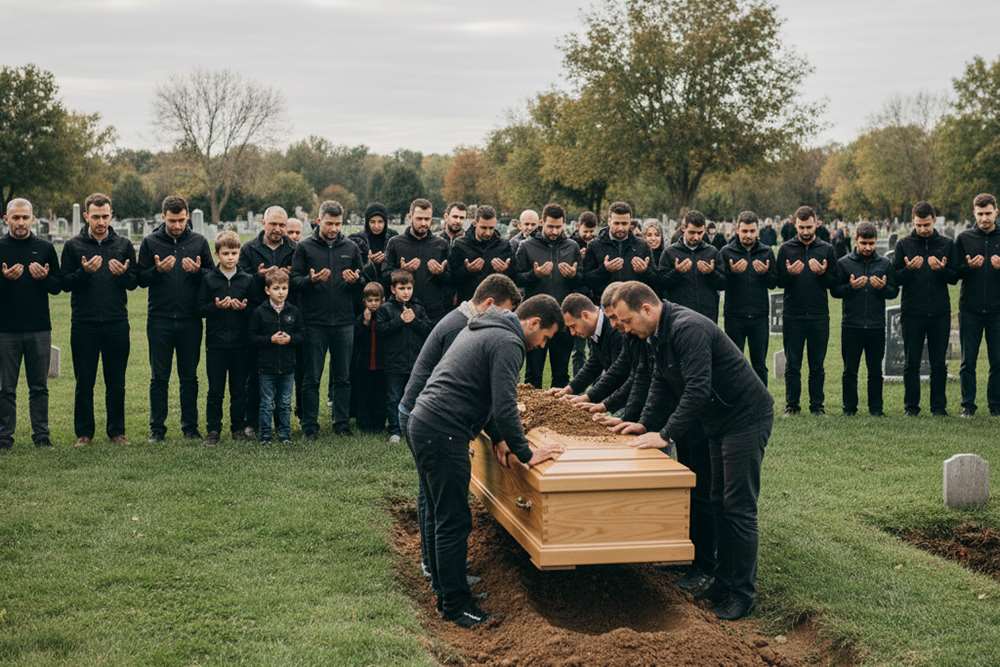Funerals are solemn occasions in every culture, but attending one outside your own tradition can feel overwhelming if you are unfamiliar with the customs. For those invited to a Muslim funeral, understanding the practices, rituals, and expected behavior is a sign of deep respect. Islamic funeral etiquette is rooted in faith, modesty, and community, with rituals designed to honor the deceased while providing comfort to their loved ones. If you find yourself attending Muslim funerals for the first time, you may wonder about what to wear, how to act, or even how to express condolences properly.
This guide outlines the most important cultural funeral tips and provides practical advice so you can feel comfortable and confident in showing respect during such a sensitive time.
Understanding the Importance of Funerals in Islam
In Islam, funerals are considered one of the most significant rites of passage. The faith teaches that death is a transition from this life to the afterlife, and the funeral serves as both a spiritual and communal event.
Key elements of Muslim mourning customs include:
- Quick burial, ideally within 24 hours of death.
- Washing and shrouding of the body (ghusl and kafan).
- A congregational prayer service (Salat al-Janazah).
- Simple burial without extravagant displays.
These practices emphasize humility, respect, and a focus on the eternal soul rather than material display.
Dress Code: What to Wear
One of the most frequently asked questions concerns attire. Islamic funeral etiquette requires dressing modestly and respectfully. Men typically wear simple clothing such as long-sleeved shirts and trousers, avoiding bright colors. Women should wear loose-fitting clothing, long sleeves, and a headscarf to cover their hair. Black is common but not mandatory—neutral, subdued colors are appropriate. By dressing conservatively, you show reverence for the occasion and align with the values of modesty central to the faith.
Gender Roles and Separation
When attending Muslim funerals, you may notice that men and women gather separately during certain parts of the service. This separation is observed in many communities to maintain modesty and focus during the prayers. Guests should follow the lead of the family and community organizers. If you are unsure where to stand or sit, quietly ask an usher or family member for guidance. Remaining respectful and flexible is always appreciated.
The Funeral Prayer: Salat al-Janazah
A central component of an Islamic funeral is the funeral prayer, known as Salat al-Janazah. This prayer is performed in congregation, often in a mosque or open space.
Guests who are Muslim will participate directly in the prayer, which includes specific recitations and supplications. Non-Muslims attending may observe respectfully, standing silently as the prayer is performed. Photography or recording is never appropriate during the service.
Understanding this moment is key to observing proper Islamic funeral etiquette—it is a sacred time of worship, reflection, and supplication for the deceased.
Condolences and Expressions of Sympathy
Words of comfort are meaningful, but they should be expressed simply and sincerely. Phrases like “I am sorry for your loss” or “May God give you strength” are appropriate. Muslims may use traditional Arabic expressions such as “Inna lillahi wa inna ilayhi raji’un” (We belong to Allah and to Him we shall return).
Avoid overly casual remarks or attempts at humor, as these moments call for solemnity. It is also considered thoughtful to offer practical support, such as providing meals or assistance to the family.
Participation in Burial
Burials take place as soon as possible, often the same day. The body is placed in a simple grave, facing Mecca. Male family members and friends usually lower the body and participate in filling the grave with soil. Non-Muslims may be present during this part of the ritual but should stand respectfully to the side unless invited to participate. This quiet presence is in line with Muslim mourning customs, which emphasize dignity and community.
Avoiding Common Mistakes
When attending Muslim funerals, it is important to avoid certain behaviors that may be considered disrespectful:
- Do not bring flowers – Unlike some traditions, flowers are generally not part of Islamic funerals.
- Avoid loud or dramatic displays of grief – Mourning is observed with dignity and composure.
- Silence phones and devices – Using a phone or camera is considered inappropriate.
- Don’t expect an open casket – Islamic practice usually involves closed shrouds and immediate burial.
By steering clear of these mistakes, you ensure your presence is supportive rather than distracting.
Food and Community Support
One of the most compassionate aspects of Islamic funerals is the community’s role in providing food and support for the grieving family. In many traditions, visitors will organize communal gatherings to ease the burden. If you are a guest, offering food, sending a meal delivery, or volunteering your help is a thoughtful way to express sympathy. This aligns with cultural funeral tips that emphasize action and community care over material gestures.
Respecting Mourning Periods
Mourning customs in Islam vary, but widows typically observe a four-month and ten-day mourning period known as iddah. During this time, widows may not remarry or engage in celebratory activities. Families may continue to receive condolences and support from their community.
For non-Muslim guests, respecting these extended periods is important. Avoid planning social celebrations with the bereaved family until after the mourning period concludes. A simple check-in message or visit shows ongoing compassion and respect for Muslim mourning customs.
Digital and Modern Considerations
In today’s world, technology sometimes intersects with tradition. Live streaming of funerals for distant relatives has become more common. Even so, Islamic funeral etiquette remains rooted in respect, presence, and solemnity.
If attending virtually, dress appropriately and ensure your environment is quiet. Avoid taking screenshots or recording the event, as these practices may be viewed as disrespectful.
Why Understanding Etiquette Matters
Funerals are universal experiences of grief and remembrance, but cultural and religious traditions give them unique meaning. By following these cultural funeral tips, you not only show respect to the deceased and their family but also build bridges of understanding between communities. In Ontario and beyond, multicultural societies thrive when individuals make the effort to respect each other’s customs. Learning about and observing Islamic funeral etiquette is part of this shared responsibility.
Final Thoughts
Attending a Muslim funeral can feel unfamiliar, but with awareness and sensitivity, it becomes an opportunity to show compassion and solidarity. From modest dress to silent observance, each action carries meaning. By respecting Islamic funeral etiquette, participating with dignity, and honoring Muslim mourning customs, guests play a role in comforting the bereaved while upholding one of the most sacred traditions of the faith.
FAQ’s
Q1. What should I wear to a Muslim funeral?
A: Guests should wear modest, conservative clothing. Men wear long sleeves and trousers; women wear loose clothing with headscarves. Neutral or subdued colors are preferred.
Q2. How should guests behave at an Islamic funeral?
A: Guests should remain respectful, quiet, and composed. Avoid flowers, phones, or disruptive behavior. Non-Muslims may observe silently during prayers and stand respectfully during burial rites.



